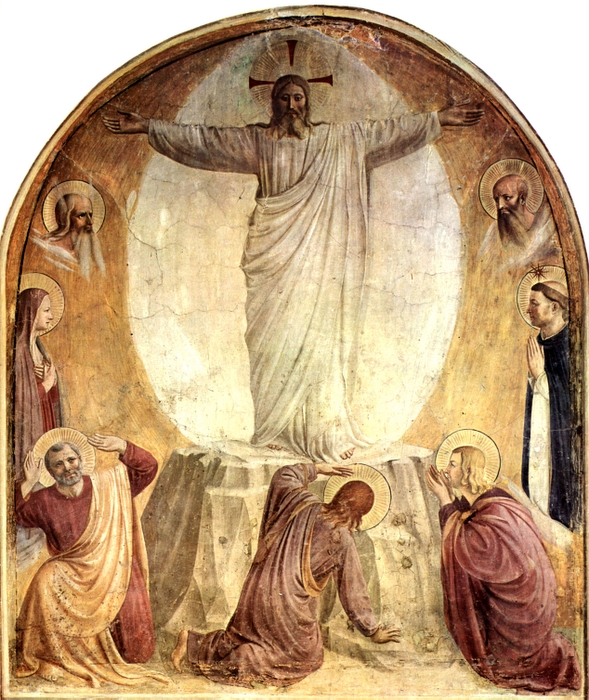
Transfiguration
fra Angelico, 1450
My dear friends,
The Transfiguration is a luminous moment in which Jesus' divine nature is revealed. It is not merely a historical event but a paradigm of our own spiritual journey. Just as Christ was transfigured, we too are called to undergo transformation, illuminating the world with wisdom and compassion. In the Bodhisattva path, this corresponds to the realization of Bodhicitta—awakening to the mind of wisdom, love and compassion for all beings. It is a vision of what we are meant to become when we transcend ignorance and embody the divine light.
Jesus took with him Peter and John and James
and went up on the mountain to pray.
- Luke 9:28
This moment echoes Moses ascending Mount Sinai with his chosen three—Aaron, Nadab, and Abihu (Exodus 24:1). The mountain, in both Christian and Buddhist traditions, symbolizes a place of elevated consciousness, where divine wisdom is received. Just as Moses brought the Law to the people, Jesus ascends to commune with God, preparing for his ultimate sacrifice, much like a Bodhisattva who ascends the path to benefit all beings.
and his clothes became as bright as a flash of lightning.
- Luke 9:29
Moses' face shone when he descended Sinai, having been in the presence of the Divine (Exodus 34:29-35). Here, Jesus is transfigured before his disciples, radiating the uncreated light. In the Mahayana tradition, a Bodhisattva’s realization brings a luminous transformation, revealing the pure nature of mind. This radiance is not external but the natural brilliance of wisdom and compassion shining forth.
- Luke 9:30
Moses and Elijah represent the Law and the Prophets, showing Jesus as their fulfillment. This meeting also signifies the unification of past and future, of tradition and transcendence. In Buddhism, the enlightened ones manifest to guide beings on the path, much like Jesus stands between these two, showing the way beyond the old into the new.
- Luke 9:31
Jesus' departure, like the Exodus, represents liberation—not only from earthly oppression but from the deeper bondage of sin and ignorance. This echoes the Buddhist notion of crossing to the other shore of enlightenment, where suffering is left behind.
but as they awoke they saw his glory and the two men who stood with him.
Just as they were leaving him, Peter said to Jesus,
"Master, it is good for us to be here; let us set up three tents,
one for you, one for Moses, and one for Elijah," not realizing what he was saying.
While he was saying this, a cloud came and overshadowed them,
and they were terrified as they entered the cloud.
- Luke 9:32-34
Peter, still grasping at permanence, seeks to enshrine the moment. But the divine cannot be confined to structures or rituals alone. Like a meditator clinging to blissful states, he must let go of attachment to fully awaken. The cloud represents the mystery of the divine, beyond concepts, beyond form.
- Luke 9:35
The voice does not instruct us to build monuments but to listen and embody the teachings. As disciples of Christ, and as Bodhisattvas, we are to manifest wisdom and compassion in the world, becoming living vessels of divine truth.
And they kept silent and in those days told no one any of the things they had seen.
- Luke 9:36
There is wisdom in silence. Some revelations are too profound for words, meant to be lived rather than merely spoken. In deep meditation, as in faith, truth is known beyond language.
May we, like Christ on the mountain, allow our hearts and minds to be transfigured by divine love and wisdom, walking the path for the liberation of all beings.